Michelle Beliveau-Miner Levels Up From Fellow to Assistant Clinical Director
September 07, 2021
September 07, 2021
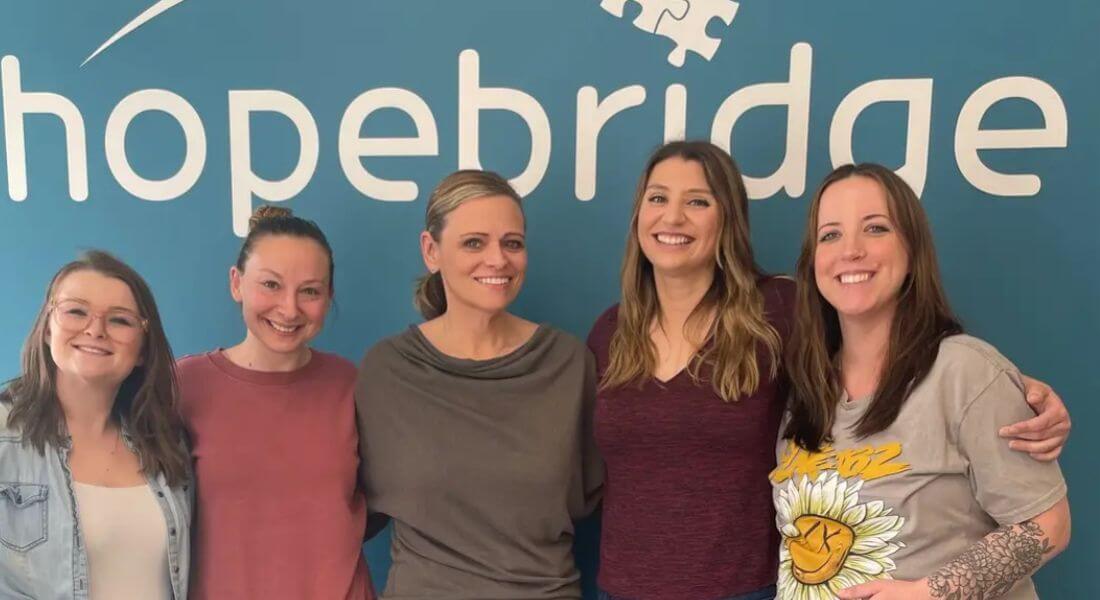
“Working in ABA therapy is the best decision I ever fell into,” Hopebridge Assistant Clinical Director (ACD) Michelle Beliveau told us.
Like many of our other Board Certified Behavior Analysts (BCBA), Michelle did not grow up dreaming of working in applied behavior analysis (ABA). Yet now, here she is, not only stumbling onto the ABA path, but thriving in it while mentoring others who have similar career goals.
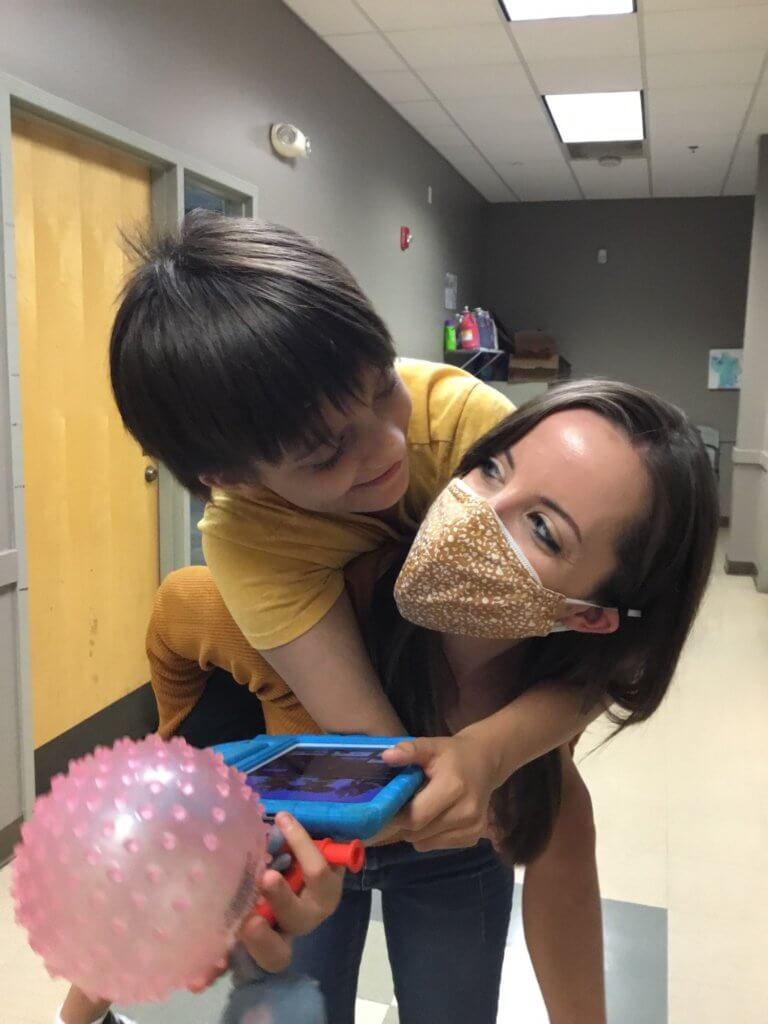
Before Michelle began serving our patients at Hopebridge Autism Therapy Centers, she was in a master’s program for social work, convinced she would ultimately end up helping individuals who need support for substance abuse. While attending school, she held a position in home visiting for families with pre- and post-natal babies. A coworker suggested checking out Hopebridge, so she applied for a job as a Registered Behavior Technician (RBT) during graduate school.
“Soon after I joined Hopebridge, I began to wonder how I would eventually leave the staff and families once I graduated,” said Michelle. “I kept thinking it didn’t feel right to leave. We had all created such a bond.”
At this point, Michelle was about halfway through her master’s program. She spoke to her husband about her options. He told her he knew what route she would choose, but that he could not tell her which decision it would be; she had to come to that conclusion on her own. It wasn’t long before she left her graduate program and instead focused on a track in behavior analysis.
“Serving these kids was my main reason for staying,” said Michelle. “I switched programs and have never looked back. I can’t imagine doing anything else.”
We’re looking for passionate, talented individuals to join our Hopebridge ABA teams. Come stand alongside people like Michelle to simultaneously teach and continue learning for kids with autism.
Even though Michelle was a year and a half into her postgraduate education before transferring to the field of ABA, she doesn’t see it as a waste. After all, more education is not a bad thing!
“The experience I received in social work gave me the ability to recognize various components that can impact treatment, even here in our centers,” said Michelle. “It gave me more insight into a trauma-informed approach, which has been beneficial.”
While along this new path to become a BCBA, Michelle joined Hopebridge’s Fellowship Program. Michelle especially values some of the BAF program’s core features: support and experience.
“The support from other Hopebridge team members was the best part of the Fellowship. Grad school is hard, then you have to take on the beast that is the board exam,” said Michelle. “It helped to have someone in my court telling me that I could do it; that I knew these questions and not to overthink them. They really hit it home so I could grow and serve these families once I passed the exam.”
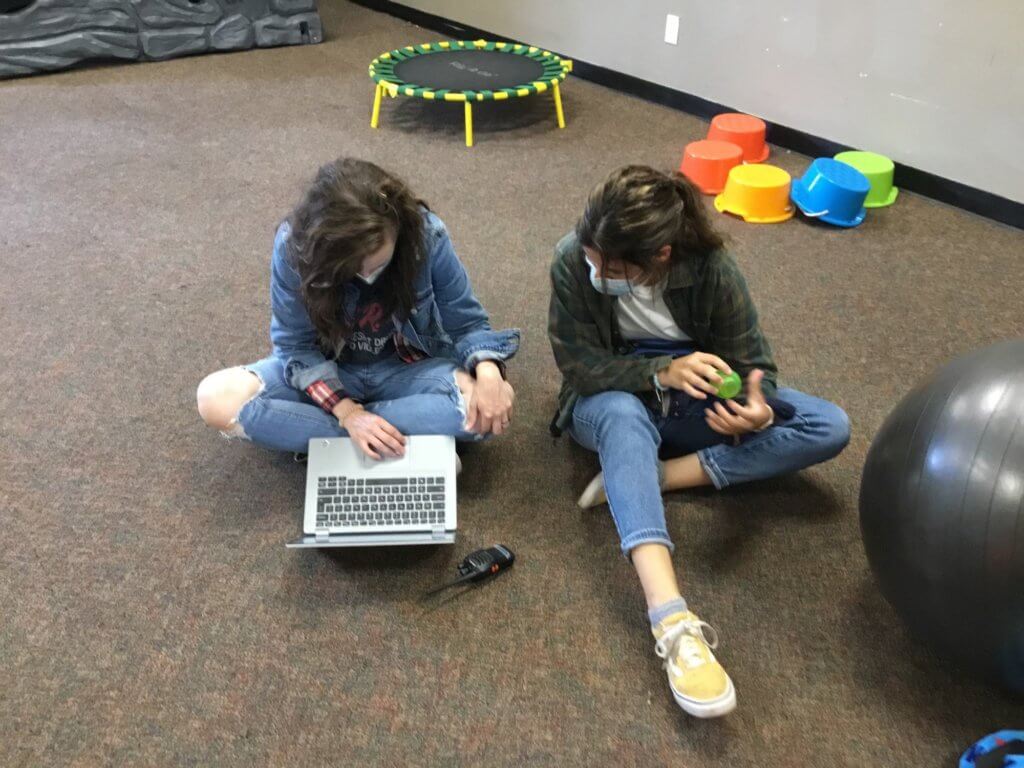
Michelle appreciated that the Fellowship Program offered her more structure while studying. She felt it helped her understand where to focus on the BCBA task list, plus offered various ways to apply what she was learning. This support was especially important to her when she missed passing the BACB exam by one question on her first try, and by two on her second. She is grateful she was able to lean on her cohort, BCBAs in her clinic, trainers, Fellows and center management.
“Statistically, the BACB exam is tougher to pass on the first time than it is for the Bar Exam,” said Michelle. “It’s always good to be one-and-done, but there’s no shame in taking it again. Each time I didn’t pass, it was another opportunity to learn. The regional management team was so supportive and reassuring each time,” said Michelle.
Another advantage for BCBA students who work at Hopebridge is the hands-on experience that comes with the fellowship program.
“As a Fellow, I had the opportunity to do a trial run as a BCBA. Spending half my day in the role of a BCBA and half as a direct therapist was sort of like using training wheels,” said Michelle. “Hopebridge gave me the opportunity to implement the material I studied so it made sense. It also made me feel more at ease when preparing for the exam and to take on a caseload because I’d already been doing the work.”
Once that Michelle finished school, passed the BCBA exam, received her certification and onboarded as an official BCBA at Hopebridge, she was on the other side, but that does not mean the growth and development ended. Since then, she has provided support to students by assisting with the Fellowship cohorts and supervising other Fellows. She especially enjoys offering new perspectives, including how to navigate from a center standpoint as well as a clinical mindset. One of her supervisees, Victoria Ebersol, recently became a BCBA in her center.
“I love being able to give back by providing that extra support. I’m there to answer questions and remind them that yes, the test is hard, but it’s only one little piece of their lives,” said Michelle. “I love being able to give back by providing that extra support. I’m there to answer questions and remind them that yes, the test is hard, but it’s only one little piece of their lives,” said Michelle. “It’s great to be able to connect with them and get that spark and drive going, while watching their confidence grow. I remember what it was like to be a student and make sure they know I’m here to help them get through it together.”
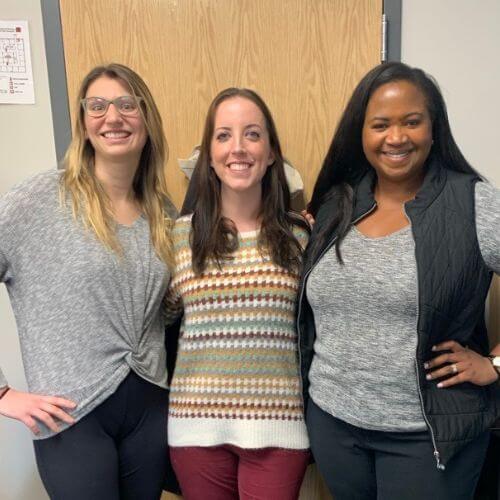
Michelle pictured with other BCBAs on their career pathway.
Michelle is constantly seeking ways to continue her growth and skillset, so when Hopebridge announced the BCBA Career Pathway, she was excited for the new opportunity to better support her team and families.
“I liked the structure it offered, as well as the opportunities. It helped me understand what I needed to focus on, plus gave me a safe place to do that,” said Michelle.
As with other roles within the BCBA Career Pathway, to become assistant clinical director for her center, Michelle had to fulfill her competencies.
“The competencies were perfect for me because they were checkpoints holding me accountable. Having these guidelines and the self-paced content was nice so I could learn at my own speed. I could go back and rewind; I could hear it, see it, write it,” said Michelle.
In addition to the self-paced content, she also appreciated the opportunity to talk to Regional BCBA Megan Hempfling and other BCBAs in her center as she prepared for the competencies. She used the time to share her takeaways and learn their own interpretations.
Though she admits the competency tests were a bit nerve-wracking because the regional BCBA came to the center to observe her work, it was her favorite part of the process. She believes it is good for BCBAs to put themselves in a vulnerable position to learn more, and for the RBTs to see that BCBAs still need to go through this process, too.
Now with a few months into the ACD role, Michelle is still serving her own patients and families, albeit with a smaller caseload as she also supports her center’s peer BCBAs. Continuing her own work as a BCBA was important to her.
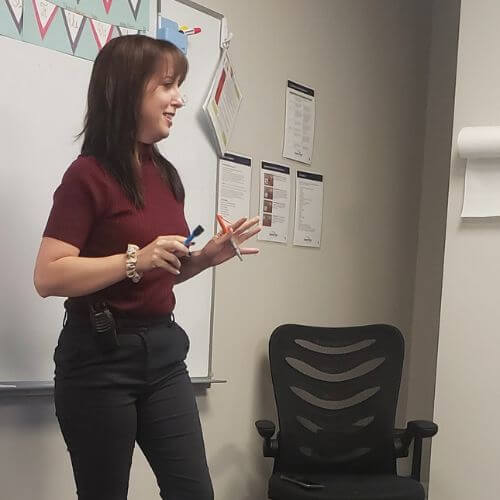
Michelle teaching her pod in a center.
“I want to provide that safe to other BCBAs that they’ve given me over the years, that way we can continue to serve our children in the best way possible,” said Michelle. “Having this extra position in the center offers our team and families more immediate support, should they need it. I am able to have eyes on all our kids and try to make daily connections.”
As an assistant clinical director, Michelle looks forward to learning more about how she can best educate her staff and serve the center’s families while simultaneously developing her leadership and clinical skills. She aims to make a difference within the community, and long-term goals include helping the community navigate autism assessments, including modifying the process to better serve populations that may not have access to autism identification and intervention.
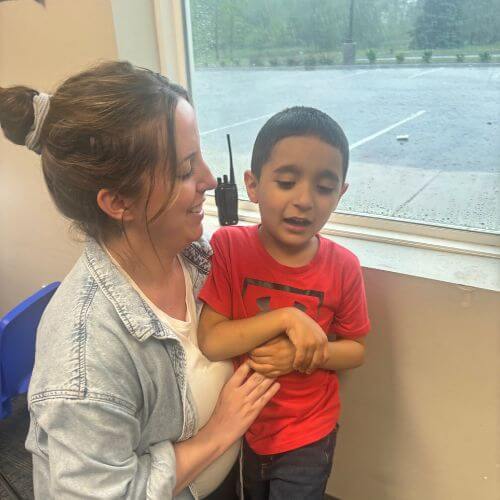
Michelle’s favorite part of the job is working with her kids and their families. She enjoys the small victories, like when a child tolerates something for the first time.
While she feels all of the kids she works with are special, there is one she will never stop thinking about. When he first started, he experienced high-intensity behaviors that interfered with his daily life. Watching him first unable to be anywhere other than his room, to tolerating sitting in a wagon or walking with his therapist without problem behaviors has been a highlight for her. They have a special bond, and he calls her, “Shelf.”
“He has such a big heart. These are the kids who drive me. They need so much love, and their intelligence and potential may go unnoticed without it,” Michelle told us, as she began to tear up a little.
“Watching them flourish into these incredible humans – without losing their unique spirit in the process – is so important to me. I never want to hinder that. I want them to be themselves. That’s why we love them and their families love them. They are all so wonderful and brilliant and I wish more of the world could see them.”
For her, it’s all about giving these kids more tools in their tool kit. While the kids are her number-one, her coworkers are not far behind. She enjoys rooting on her RBTs, as well as collaborating with the center’s other BCBAs and multidisciplinary staff that make up Hopebridge’s 360 Care.
“I feel lucky to work alongside these other disciplines with varied experience and education. Without them, my kids may not make progress outside their rooms,” said Michelle. “I like being able to shadow my kids while they participate in other services, like speech or occupational therapy. I like how all the pieces come together to help our kids.”
She’s found being able to ask questions of each other is a perk of the job and encourages other BAF students to take the initiative to do the same.
“At the end of the day, I couldn’t do any of this without my RBTs,” said Michelle, who said she is also grateful to have her clinical manager and center coordinator, Carrie and Catherine, encouraging her every step of the way, plus for the connection she has with Megan and Senior BCBA Dana Kozinski.
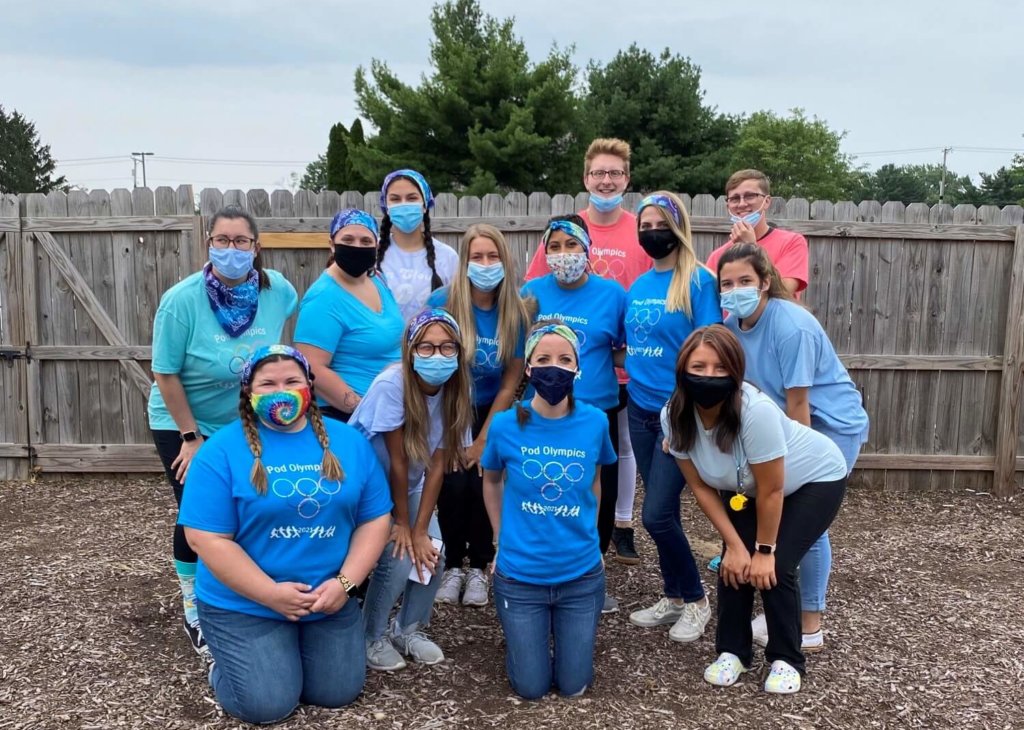
If leveling up your RBT status to join the Fellowship Program interests you, we invite you to apply to join our team. Already a BCBA? Grow your career alongside other passionate professionals within the autism community with in-house education and training programs, plus clear job advancement opportunities through the BCBA Career Pathway at one of our locations across the country.
*Informed consent was obtained from the participants in this article. This information should not be captured and reused without express permission from Hopebridge, LLC.